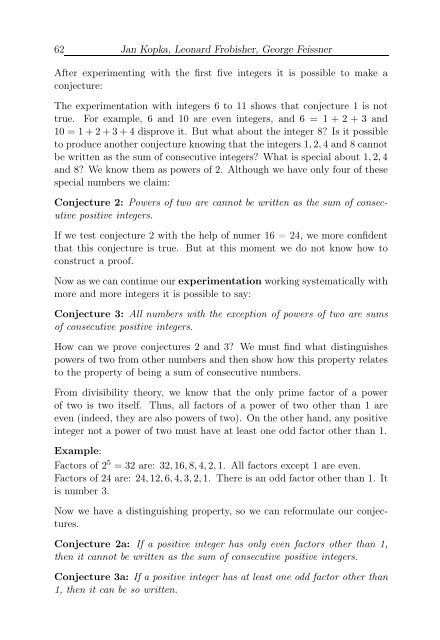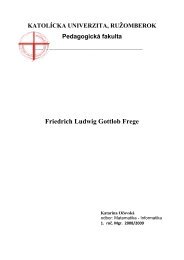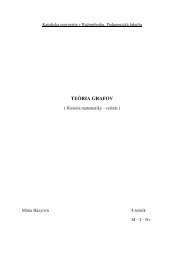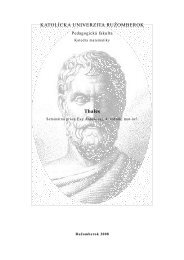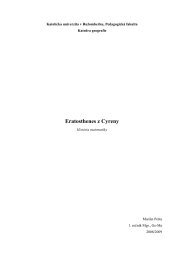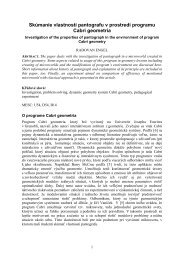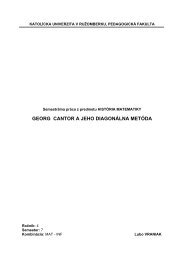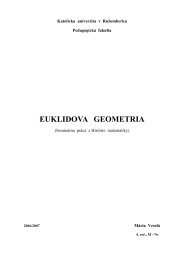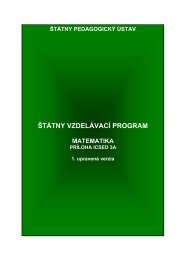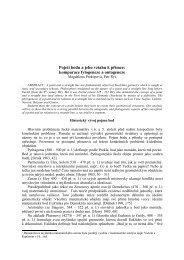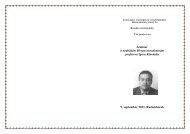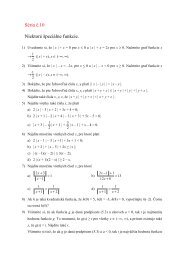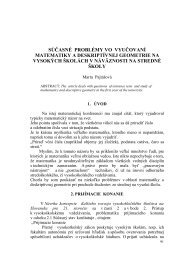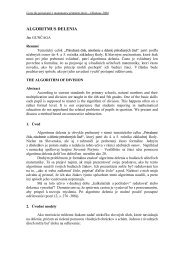- Page 3 and 4:
TEACHING MATHEMATICS II:INNOVATION,
- Page 5 and 6:
Scientific IssuesCatholic Universit
- Page 7 and 8:
CONTENTSBillich Martin. Zobrazenia
- Page 9:
PREFACEThe greatest challenge in wr
- Page 12 and 13:
10 Martin BillichV práci [3] Jung
- Page 14 and 15: 12 Martin Billich(a) Int S i ∩Int
- Page 16 and 17: 14 Jaroslava BrinckováKombinatoric
- Page 18 and 19: 16 Jaroslava Brincková4. Pre žiak
- Page 20 and 21: 18 Jaroslava Brinckovájúceho št
- Page 22 and 23: 20 Ján Gunčaga- vyučovanie matem
- Page 24 and 25: 22 Ján Gunčaga3. Teória Zoltána
- Page 26 and 27: 24 Ján Gunčaga5. SymbolizovanieV
- Page 28 and 29: 26 Ján GunčagaZ hľadiska vzťahu
- Page 30 and 31: 28 Ján Gunčaga7. učiť žiakov d
- Page 33 and 34: Catholic University in RužomberokS
- Page 35 and 36: Popis výskumu zameraného na vyuč
- Page 37 and 38: Popis výskumu zameraného na vyuč
- Page 39 and 40: Popis výskumu zameraného na vyuč
- Page 41 and 42: Popis výskumu zameraného na vyuč
- Page 43: Popis výskumu zameraného na vyuč
- Page 46 and 47: 44 Marika Kafkovábyly, jsou a ješ
- Page 48 and 49: 46 Marika Kafkovánikdy nedostane z
- Page 50 and 51: 48 Marika Kafkovánedala řešit ji
- Page 52 and 53: 50 Mária Kolkovápokusu. Veľa ča
- Page 54 and 55: 52 Mária KolkováObrázok 1 - Rie
- Page 56 and 57: 54 Mária Kolková3. Vzťah medzi s
- Page 58 and 59: 56 Mária Kolkováže riešenie Cez
- Page 61: Catholic University in RužomberokS
- Page 66 and 67: 64 Jan Kopka, Leonard Frobisher, Ge
- Page 68 and 69: 66 Jan Kopka, Leonard Frobisher, Ge
- Page 70 and 71: 68 Jan Kopka, Leonard Frobisher, Ge
- Page 72 and 73: 70 Lilla Koreňováštyroch triedac
- Page 74 and 75: 72 Lilla KoreňováOdborníci odhad
- Page 76 and 77: 74 Lilla KoreňováÚloha 5. Aké r
- Page 78 and 79: 76 Lilla Koreňová1. Určite áno2
- Page 80 and 81: 78 Lilla Koreňová1. Určite áno2
- Page 83 and 84: Catholic University in RužomberokS
- Page 85 and 86: CommentsOn J-conic sections 83We to
- Page 87 and 88: On J-conic sections 85Figure 2. The
- Page 89 and 90: On J-conic sections 87Preparing a c
- Page 91 and 92: Catholic University in RužomberokS
- Page 93 and 94: Refleksje nad wykorzystywaniem wied
- Page 95 and 96: Refleksje nad wykorzystywaniem wied
- Page 97 and 98: Refleksje nad wykorzystywaniem wied
- Page 99 and 100: Refleksje nad wykorzystywaniem wied
- Page 101 and 102: Refleksje nad wykorzystywaniem wied
- Page 103 and 104: Catholic University in RužomberokS
- Page 105 and 106: Losowe gry hazardowe a proces decyz
- Page 107 and 108: Losowe gry hazardowe a proces decyz
- Page 109 and 110: Losowe gry hazardowe a proces decyz
- Page 111 and 112: Losowe gry hazardowe a proces decyz
- Page 113 and 114: Losowe gry hazardowe a proces decyz
- Page 115:
ZakończenieLosowe gry hazardowe a
- Page 118 and 119:
116 Daša Palenčárová2. Implicit
- Page 120 and 121:
118 Daša PalenčárováÚloha 1 (s
- Page 122 and 123:
120 Daša PalenčárováNajčastej
- Page 125 and 126:
Catholic University in RužomberokS
- Page 127 and 128:
Premena interaktívnej tabule z hra
- Page 129 and 130:
Premena interaktívnej tabule z hra
- Page 131 and 132:
Premena interaktívnej tabule z hra
- Page 133 and 134:
Catholic University in RužomberokS
- Page 135 and 136:
Vedomosti študentov zo štatistiky
- Page 137 and 138:
Vedomosti študentov zo štatistiky
- Page 139 and 140:
Vedomosti študentov zo štatistiky
- Page 141 and 142:
Vedomosti študentov zo štatistiky
- Page 143 and 144:
Catholic University in RužomberokS
- Page 145 and 146:
Kľúčové kompetencie a diskrétn
- Page 147 and 148:
Kľúčové kompetencie a diskrétn
- Page 149 and 150:
Kľúčové kompetencie a diskrétn
- Page 151 and 152:
Catholic University in RužomberokS
- Page 153 and 154:
Examples of introducing chosen conc
- Page 155 and 156:
Examples of introducing chosen conc
- Page 157 and 158:
Catholic University in RužomberokS
- Page 159 and 160:
Examples of using ICT for forming r
- Page 161 and 162:
Examples of using ICT for forming r
- Page 163 and 164:
Examples of using ICT for forming r
- Page 165 and 166:
Catholic University in RužomberokS
- Page 167 and 168:
Tvorba školského vzdelávacieho p
- Page 169 and 170:
Catholic University in RužomberokS
- Page 171 and 172:
Language Aspects of the Initial Pha
- Page 173:
Language Aspects of the Initial Pha
- Page 176 and 177:
174 Takács István Árpád• What
- Page 178 and 179:
176 Takács István ÁrpádAsk the
- Page 180 and 181:
178 Takács István Árpád3. Concl
- Page 182 and 183:
180 Štefan TkačikDemokritos rozvi
- Page 184 and 185:
182 Štefan Tkačik2. Eudoxova exha
- Page 186 and 187:
184 Štefan Tkačikhranoly. Ostanú
- Page 188 and 189:
186 Štefan TkačikPre každé čí
- Page 190 and 191:
188 Štefan TkačikDefinícia 1. Fu
- Page 192 and 193:
190 Štefan TkačikArchimedov integ
- Page 194 and 195:
192 Erika TomkováAk PS chváli, mi
- Page 196 and 197:
194 Erika TomkováPrednosťou vytvo
- Page 198 and 199:
196 Erika Tomkováré, keď pri jed
- Page 200 and 201:
198 Erika Tomková[8] JODAS, V.: Ob
- Page 202 and 203:
200 Peter Vankúš, Emília Kubicov
- Page 204 and 205:
202 Peter Vankúš, Emília Kubicov
- Page 206 and 207:
204 Peter Vankúš, Emília Kubicov
- Page 208 and 209:
206 Peter Vankúš, Emília Kubicov
- Page 210:
208 Peter Vankúš, Emília Kubicov


